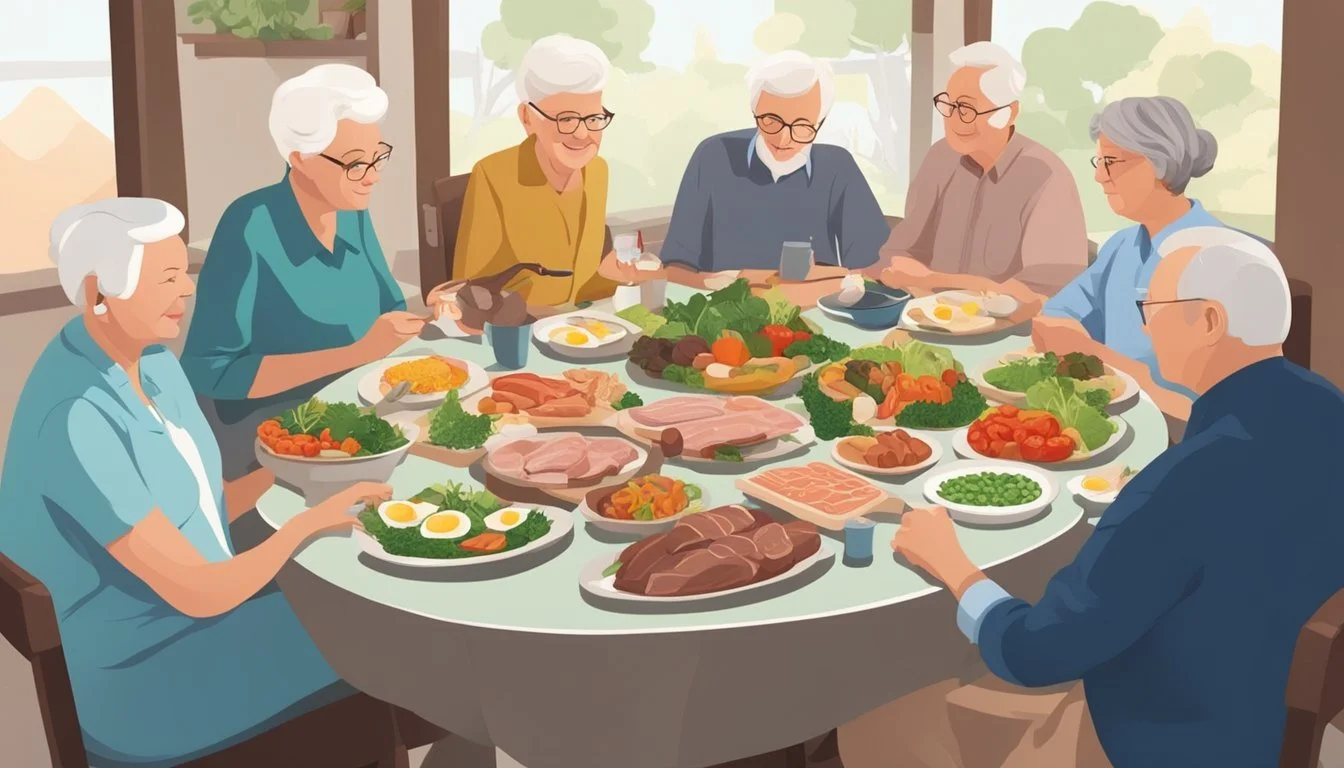The Carnivore Diet for Seniors
Evaluating Nutritional Benefits and Risks in Older Adults
As individuals age, their nutritional requirements evolve, and adopting a diet that aligns with these changes is crucial for healthy aging. For seniors, a diet that supports muscle maintenance, bone health, and metabolic function is especially important. Given these needs, the carnivore diet, which is high in protein and focuses on animal products, has garnered attention for its potential benefits for the elderly population.
The carnivore diet simplistically consists of almost exclusively animal-based foods and eliminates most other food groups, including fruits, vegetables, grains, and nuts. Advocates suggest it can lead to improved mobility, mental clarity, and the management of chronic metabolic diseases, which are considerations of significant importance as one’s body ages. While this diet emphasizes nutrient-dense foods, it’s also the subject of debate regarding its long-term health impacts and suitability for seniors.
Nutritionists emphasize the importance of tailoring any diet to an individual’s specific health conditions, needs, and goals. For seniors considering the carnivore diet, it is especially vital to consult healthcare professionals to ensure the diet provides balanced nutrition and aligns with their overall health strategy for aging.
Understanding the Carnivore Diet
The Carnivore Diet is rooted in the consumption of exclusively animal products, championing protein and fat while eliminating carbohydrates and fiber typically found in plant-based foods.
Basic Principles of the Carnivore Diet
The Carnivore Diet requires individuals to consume solely animal-based foods. This includes meat from various animals, eggs, and dairy products such as cheese and butter. The diet is devoid of carbohydrates, thus eliminating all fruits, vegetables, legumes, grains, nuts, and seeds. Its focus is on high-fat and high-protein foods, with the idea that these can provide all the necessary nutrients the body requires.
Differences from Other Diets
In stark contrast to mixed-diet approaches, the Carnivore Diet does not include vegetables, fruits, or any plant-derived fiber. Unlike ketogenic diets which also promote high fat but allow low carbohydrate intake, the Carnivore Diet removes carbohydrates entirely. Difference from vegetarian and vegan diets are even more pronounced, as those eliminate animal products while the Carnivore Diet consists exclusively of them.
Pros and Cons for Seniors
For seniors, evaluating the pros and cons of the Carnivore Diet is essential.
Pros:
Simplified meal planning, as choices are limited to animal products.
Potential improved satiety from high levels of protein and fat, which may aid in weight management.
Cons:
Lack of fiber might affect digestion, possibly leading to constipation or other digestive issues.
Nutrient deficiencies may arise due to the absence of certain vitamins and minerals typically found in plant-based foods.
The reduction in carbohydrates might impact energy levels and overall mental health.
Seniors should carefully consider their nutritional needs and personal health conditions before making significant changes to their diet.
Nutritional Needs of Seniors
Aging bodies require tailored nutrition to maintain health, with a focus on essential macronutrients and micronutrients, adequate protein for muscle maintenance, and balanced energy levels to support an active lifestyle.
Macronutrients and Micronutrients
Seniors should prioritize a diet rich in nutrients while being mindful of calorie intake. Carbohydrates should come from complex sources like whole grains and vegetables, providing sustained energy without rapid blood sugar spikes. Fats are important for brain health and should include sources high in omega-3 fatty acids, such as fish and flax seeds.
Carbohydrates: Aim for complex carbs that provide fiber and nutrients.
Fats: Include healthy fats, such as those from avocado, nuts, and olive oil.
Micronutrients in the form of vitamins and minerals are crucial for preventing deficiencies. Calcium, vitamin D, and vitamin B12 are often needed in higher amounts.
Calcium: Essential for bone health, best sourced from dairy products or fortified alternatives.
Vitamin D: Important for calcium absorption and immune function.
Vitamin B12: Necessary for nerve function and the production of DNA and red blood cells, which can be more difficult to absorb with age.
Make your life easier by ordering calcium, vitamin D, and vitamin B12 online; it's just a few clicks away!
The Role of Protein in Aging
Protein intake for seniors is vital for maintaining muscle mass and strength, which can deteriorate with age. A higher intake of lean proteins like chicken, fish, tofu, and legumes can help mitigate muscle loss and aid in physical function.
Lean meats: Chicken, turkey, and fish are good choices.
Plant-based proteins: Lentils, beans, and tofu provide protein without the saturated fats.
Managing Energy Levels with Diet
Seniors often experience changes in metabolism, making energy management through diet critical. Balancing meals with proper portions of carbs, fats, and protein can help maintain consistent energy levels throughout the day.
Regular meals: Consistent meal times can help regulate energy.
Balanced portions: Equal portions of proteins, carbs, and fats can help maintain energy.
Health Considerations
When considering a carnivore diet for seniors, one must carefully evaluate its effects on various aspects of health including heart and digestive systems, as well as bone health and body weight management.
Heart Health and Red Meat Consumption
The carnivore diet, being high in red meat (What wine goes well with red meat?), raises concerns about heart disease and cholesterol levels due to the saturated fat found in animal fat. It's crucial for seniors to consider the potential impact on heart health, as studies have indicated that excessive consumption of red meat may be associated with a higher risk of heart disease and high blood pressure. Alternating with lean cuts and monitoring overall intake can be beneficial.
Weight Management and Obesity Prevention
Weight loss and obesity prevention are significant for aging individuals to reduce the risk of chronic diseases. The carnivore diet might assist in weight management due to its high protein content, which can increase satiety and reduce overall calorie consumption. However, the absence of fiber demands attention as it plays a role in digestive health and weight control.
Bone Health and Calcium Intake
For seniors, bone health is paramount to prevent fractures and osteoporosis. The carnivore diet provides protein which is essential for maintaining muscle mass and bone density. Still, a potential lack of dietary calcium, primarily found in dairy and plant-based sources, could necessitate supplementation or careful dietary planning to ensure adequate intake.
Digestive Health in Aging
Digestive efficiency often declines with age, leading to issues such as constipation and inefficient digestion. The lack of dietary fiber in the carnivore diet could exacerbate these issues. Conversely, some individuals may experience reduced inflammation and improvement in digestive conditions due to the elimination of certain plant-based foods. Careful consideration and monitoring of digestive symptoms are advised for seniors following this diet.
Risks and Side Effects
When adopting the carnivore diet, seniors must be aware of potential risks and adverse effects that could impact their overall health. The diet's exclusion of plant-based foods can lead to specific concerns which need to be addressed with care.
Nutritional Deficiencies and Supplements
The carnivore diet, by excluding plant-based foods, significantly limits the intake of fiber, vitamins, and minerals, which are essential for maintaining health in aging individuals. One may develop deficiencies in vitamin C, vitamin E, and folate, as these nutrients are typically found in fruits and vegetables. To prevent such deficiencies, careful planning and possible supplementation is advised.
Avoid the crowds and shop for fiber supplement, vitamin C, vitamin E, and folate online from the comfort of your home!
Implications for Chronic Conditions
A diet high in animal products may exacerbate preexisting chronic conditions, such as heart disease, due to increased consumption of saturated fat. The higher intake of red and processed meats is associated with elevated risks of certain diseases, including colorectal cancer. It is crucial for seniors to consult with healthcare providers to consider these implications and adjust their diet as needed.
Kidney Function and High-Protein Diets
A high-protein diet, characteristic of carnivore eating patterns, can strain kidney function over time, especially in seniors who may already be experiencing age-related kidney decline. High levels of protein can exacerbate the progression of kidney diseases, leading to further impairment. Monitoring and moderating protein intake based on individual kidney health is important.
Meal Planning and Adaptation
Effective meal planning and adaptation on a carnivore diet can help seniors meet their nutritional needs while simplifying dietary choices. Prioritizing variety and a gradual shift can lead to a more sustainable and satisfying diet experience for older adults.
Incorporating Variety
While the carnivore diet primarily involves animal-based foods, it is crucial to incorporate a variety of meats to ensure a broad intake of nutrients. Seniors can include different types of meat such as beef, pork, and chicken in their diet alongside other animal products like fish, eggs, and dairy to prevent monotony and nutritional gaps. Including organ meats is also beneficial, as they are dense in vitamins and minerals.
Beef: Rich in iron and vitamin B12
Pork: Source of thiamine and selenium
Chicken: Contains niacin and phosphorus
Fish: High in omega-3 fatty acids; salmon is an excellent choice
Eggs: Provide choline and vitamin D
Organ Meats: Liver, for instance, is a powerhouse of nutrients
Carnivore Diet Meal Ideas for Seniors
Seniors on the carnivore diet should focus on meals that are not only nutrient-dense but also easy to prepare. Here are some meal ideas that align with the carnivore diet and can be particularly satisfying:
Breakfast: Scrambled eggs with bacon or sautéed liver in lard
Lunch: Grilled chicken breasts with a side of bone broth
Dinner: Baked salmon with a dollop of butter or a pork chop cooked in dairy-based cream sauce
Snacks can include items like cheese or a handful of pork rinds. These meal ideas can be prepared with minimal steps, providing convenience for seniors.
Transitioning to the Carnivore Diet
Transitioning to a carnivore diet should be a gradual process, especially for seniors. Start by introducing animal-based foods while removing non-animal products at a manageable pace. It's important to monitor the body's response to the diet and adjust accordingly. One might begin with a more varied selection of animal products and then, if desired, narrow down to specific types like beef only, which is often used in elimination diets to pinpoint food sensitivities.
Lifestyle Integration
Integrating the carnivore diet into a senior's lifestyle requires thoughtful consideration of physical activity and social engagement to support overall mental and physical health during aging.
Combining Diet with Exercise
Physical Activity: Given that muscle mass and bone density decrease with age, seniors on the carnivore diet should also emphasize regular exercise. Resistance training and weight-bearing activities are particularly beneficial for maintaining strength and mobility. These activities not only complement the high protein intake from a meat-based diet but also aid in preserving muscle mass, which is crucial for aging adults.
Exercise Recommendations:
Strength training: at least twice per week
Aerobic activities: 150 minutes of moderate intensity or 75 minutes of vigorous intensity per week
Flexibility exercises: daily stretching to maintain joint health
Mental Health Benefits: Regular physical activity has been shown to reduce symptoms of depression and anxiety. It also promotes attention and memory function, crucial aspects of mental health that can deteriorate with age.
Social and Psychological Aspects
Community and Connection: Seniors integrating a carnivore diet into their lifestyle should consider the diet's social implications. Meal times are traditionally communal activities, and dietary restrictions can isolate individuals if not properly managed. Therefore, they should seek social settings that accommodate or respect their dietary choices to maintain social connections, which are integral to psychological well-being.
Mental Health: Depression and anxiety can impact seniors, and the lack of variety in the carnivore diet poses a risk of diminishing the enjoyment of eating, which could affect their mental health. Furthermore, the act of sharing meals and adhering to cultural norms around food plays a role in one's sense of belonging and happiness.
Recommendations to Foster Mental Well-Being:
Participate in community events that are not centered around food.
Engage in social activities that allow for dietary flexibility.
Maintain open dialogue with friends and family about dietary needs.
Integrating the carnivore diet into a senior's lifestyle extends beyond nutrition, touching on the importance of physical exercise and social interactions, both of which play a significant role in the aging process.
Scientific Research and Evidence
Research on dietary patterns is pivotal in understanding their impact on health, particularly in seniors. Two key areas of interest are the interaction of diet with the aging process, and the specific outcomes related to the carnivore diet.
Studies on Aging and Diet
A systematic review examining the role of nutrition on aging highlighted the significance of diet in modulating aging-related biomarkers. Certain diets are associated with reduced morbidity and improved longevity. Healthy diets can influence cognitive function, psychological well-being, sensory function, vitality, and mobility—all crucial components of healthy aging as defined by the World Health Organization (WHO).
Emerging evidence suggests that dietary patterns, including those high in animal products, can be linked to various health outcomes in seniors. It is proposed that optimizing nutrition can prevent or reduce the onset of chronic age-related diseases such as heart disease and cancer, and contribute to longevity.
Long-Term Effects of the Carnivore Diet
The carnivore diet, an extreme form of the ketogenic diet that is composed almost entirely of animal products, is a subject of ongoing study. The absence of certain food groups in this diet raises questions about the potential risks associated with nutritional deficiencies. Given its recent popularity, long-term data on the carnivore diet's effects is limited, and the scientific community has called for more rigorous research to establish evidence-based conclusions.
Initial evidence from research into ketogenic diets — which are related to the carnivore diet — suggest potential benefits for certain health conditions. However, the long-term health effects specific to the carnivore diet, including its impact on chronic disease prevention and longevity, are still under investigation. The scientific community has yet to reach a consensus on whether a diet so heavily focused on animal-sourced foods can provide all essential nutrients needed for healthy aging without leading to negative outcomes such as increased cancer or heart disease risk.
Comparative Diets and Perspectives
In the context of senior nutrition, understanding how different dietary regimens impact aging is crucial. This section compares the Carnivore Diet with the Mediterranean and Ketogenic diets, examining how their different nutritional profiles address the needs of older adults.
Mediterranean Diet Versus Carnivore Diet
The Mediterranean Diet is characterized by its high consumption of fruits, vegetables, whole grains, legumes, and especially olive oil, a source of heart-healthy monounsaturated fats and polyphenols. This diet also includes moderate amounts of fish and poultry, which provide omega-3 fatty acids - vital for brain health. In contrast, the Carnivore Diet is entirely animal-based, excluding plant-derived nutrients, but potentially simplifying meal planning and addressing specific autoimmune or chronic conditions.
Key Differences:
Primary Fat Source: Mediterranean (Olive oil), Carnivore (Animal fats)
Protein Source: Mediterranean (Varied including plant sources), Carnivore (Exclusively animal meat)
Carbohydrate Intake: Mediterranean (Moderate), Carnivore (Minimal to none)
Fiber Source: Mediterranean (Fruits, vegetables, legumes), Carnivore (Absent)
Ketogenic Diet and Low-Carb Approaches
The Ketogenic Diet, often referred to as keto, has parallels with the Carnivore Diet due to its low carbohydrate approach, although keto focuses on high-fat intake and moderate protein to induce ketosis. It includes non-starchy vegetables and sometimes dairy, absent in a strict Carnivore plan. The reduction of carbohydrates aims to minimize blood sugar spikes, which can be beneficial for managing diabetes, a common concern in aging populations.
Key Components:
Fat Intake: Keto (High, with sources like dairy and certain oils), Carnivore (High, mostly from meats)
Carbohydrates: Keto (Very low, mostly from vegetables), Carnivore (Almost non-existent)
Ketosis: Keto (Goal to achieve metabolic state), Carnivore (Possible but not the primary focus)
Both diets reduce carbohydrate intake, but the keto diet allows for a broader range of foods than the carnivore diet. It's important for seniors to consider their overall health goals, potential dietary restrictions, and nutritional needs when choosing between these diets.
Conclusion
The Carnivore Diet, which emphasizes animal-based foods while eliminating plant-based foods, presents as a simplified dietary approach that seniors may consider. With an emphasis on nutrient-dense intake, there is an implication for potential health benefits such as improved mobility and management of metabolic disorders. However, this diet is relatively new and sparsely studied with respect to long-term impacts, particularly in the aging population.
Nutrition plays a critical role in healthy aging, contributing to the maintenance of bodily functions and mental health. Seniors focusing on their diet may see changes in their well-being and management of age-related health issues. The Carnivore Diet has been anecdotally linked to increased energy levels and a reduction in indigestion and bloating among older adults.
Despite the individual reports of positive outcomes, it is imperative to consider that nutritional requirements for elderly individuals are complex and vary widely. Essential nutrients are crucial for maintaining health, and any dietary approach should aim to provide these. Since the Carnivore Diet excludes plant foods, there may be a risk of nutritional deficiencies if not carefully managed.
Prospective adopters of the Carnivore Diet should seek guidance from healthcare professionals to ensure that their specific nutritional needs are met, especially as these needs can vary during the aging process. Future, rigorous studies are necessary to provide a more conclusive perspective on the appropriateness of the Carnivore Diet for seniors and its long-term effects on health and nutrition in the context of healthy aging.
















